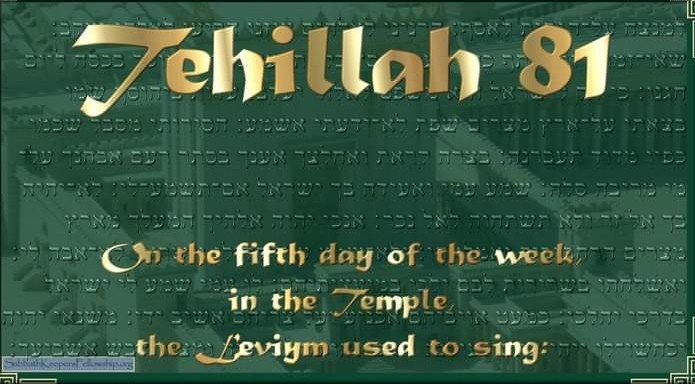Watch
Events
Articles
Market
More
Sabbath Keepers Fellowship & Prison Ministry
Min Hazaqen Torah Study Group on Facebook
Christi Banks
Yochanan Ben Yisrael
Tehillah 81 - Day 5 (Yom Chamishy)
Shout for joy to Elohim our strength; Raise a shout to the Elohim of Ya‛aqoḇ.
Lift up a song and beat the tambourine, The pleasant lyre and with the harp.
Blow a shophar in the New moon, in the covering for the day of our festival.
For this is a law for Yisra’ěl, And a judgment of the Elohim of Ya‛aqoḇ.
He appointed it in Yehosěph for a witness, When He went throughout the land of Mitsrayim; I heard a language that I did not know.
He says, “I removed his shoulder from the burden; His hands were freed from the baskets.
“You called in distress, and I rescued you; I answered you in the covering of thunder; I proved you at the waters of Meriḇah. Selah.
“Hear, O My people, and let Me warn you, O Yisra’ěl, if you would listen to Me!
“Let there be no strange mighty one among you, And do not bow down to a foreign mighty one.
“I am YHWH your Elohim, Who brought you out of the land of Mitsrayim; Open your mouth wide, and I fill it.
“But My people did not listen to My voice, And Yisra’ěl would not submit to Me.
“So I gave them over to their own stubborn heart, To walk in their own counsels.
“O, if My people had listened to Me, Yisra’ěl would walk in My ways, I would subdue their enemies at once, And turn My hand against their adversaries!
“Those who hate YHWH would cringe before Him; And their time of punishment be forever.
“He would feed them with the finest of wheat; And with honey from the rock I would satisfy you.”




But when they measured it with an omer, whoever gathered much had nothing left over, and whoever gathered little had no lack. Each of them gathered as much as he could eat.
Exodus 16:18
This is a statement about salvation, not economics. The manna is a picture of Messiah #yeshua. There was no work involved in collecting the manna. You just had to walk outside and scoop it up. You could work more if you wanted, but you'd never get more manna no matter how much you worked.
Salvation is a free gift available to anyone willing to accept Yeshua's proposal. More obedience or getting "more #jesus" won't make you any more saved.



This is what YHWH has commanded: ‘Gather of it, each one of you, as much as he can eat. You shall each take an omer, according to the number of the persons that each of you has in his tent.’
Exodus 16:16
Each person that gathered was gathering for himself, but also for his family. If manna was intended as an allegory of #yeshua, the ultimate Bread of Life, this adds some depth to Paul's statements about families being sanctified by the faith of a single member. We are each responsible for our own submission to Messiah, but our submission overflows and also feeds the members of our household.



Egypt learned about God from the plagues.
Israel learned about God from the plagues, the wilderness, manna, rock, quail, and brass serpent.
Don't be too worried when the universe seems to be against you. Troubles are often a sign that God loves you and wants you to learn something important.



When the people of Israel saw the manna, they said to one another, “What is it?” For they did not know what it was. And Moses said to them, “It is the bread that YHWH has given you to eat.”
Exodus 16:15
Water is symbolic of God's Spirit. The manna in the wilderness, bread from Heaven, was given by dew, and #yeshua, the Bread of Life sent from Heaven, was given by the Holy Spirit. Israel didn't recognize the manna when God sent it to save them, and neither did they recognize Yeshua when they saw him.


